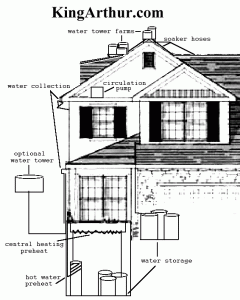Cooling System Formulas
This article is part of a series on The Waterfall House energy experiment.
The Waterfall House had been up and running for several months.
After having two record days of heat in a row, I was asked:
Q: HOW IS YOUR COOLING SYSTEM WORKING NOW!!!???
A: Great! The details follow. In a nutshell — Yeeha! Unfriggin’ believable!!!
60 gallons of water evaporated so far today.
It feels like each level of the house is equivalent in temperature to being one level lower. (i.e. the 3rd floor feels like you are on the 2nd floor… 2nd feels like you are on the 1st… and the 1st floor feels like you are in the basement)
That is about a 10-20 degree drop downstairs. On the 3rd floor, it averages about 20-30 degrees cooler with the system running.
While Sidd was in town, he was gracious enough to help my pea brain through the math (see below.)
On a typical hot day, I’m evaporating 40 gallons of water. The math suggests that each gallon of evaporated water is equal to running a typical air conditioner for 1 hour.
Or, you could say I’m saving 40-60 air conditioning hours a day.
Likewise, I would have to run 40-60 air conditioners for 1 hour to achieve the same affect.
THE FORMULAS
L = latent heat of evaporation / unit Volume
Q = heat removed
Q = VL
L = 8,094 BTU / gallon
notes:
1 BTU = 1055 Joules
1 BTU heats 1 pound of water by 1 degree F
L fusion = 80 calories (to freeze water)
L evaporation = 536 calories
1 calorie = 4.2 joules
1 calorie raises the temperature of 1 gm (or cc) of water by 1 degree C
1 US gallon = 3.8 liters = 3800 cc

